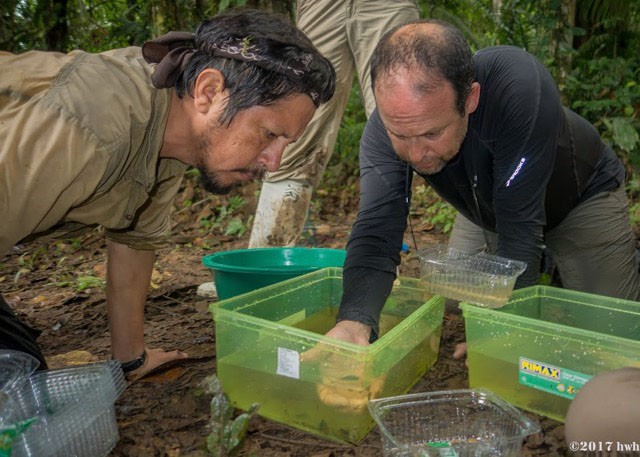UA Study Abroad offers more than just semesters abroad for students learning languages or studying culture. Many short-term options focus on science.
One such trip is the winter break expedition to the Ecuadorian rain forest, lead by Hans-Werner Herrmann, a research scientist and adjunct professor in the School of Natural Resources and the Environment.
“This is a first glimpse for an undergraduate to get a little bit of international experience,” Herrmann said.

Lasting about two weeks and costing, all expenses included, around $5,730, student participants of SWES 495F/595F Amazon Rainforest Conservation Biology in Ecuador perform field work in Yasuni National Park, one of the most biologically diverse areas in the world.
Herrmann said students have a number of assignments on the trip. They keep a field notebook, lead a discussion of a peer-reviewed paper, present on a relevant scientific topic to the group and write a 10-page research paper on their individual research project once they return to the U.S.
“From talking with the students about the scientific paper discussion or the research project, I have the impression that’s the first time students do that,” Herrmann said. “It’s an exercise in getting used to the research that can be done in a short timeframe and an experience in how to plan and conduct something like this.”
Most importantly, the students spend a lot of time in the rain forest.
RELATED: Geoscience field course Sense of Place celebrates 25th anniversary
Alaina Michaels, a biology junior, participated last winter. She found out about the trip through personal research and said she doesn’t know why it’s not more popular.
“I didn’t want to study abroad for a whole semester because I don’t have time,” Michaels said. “For the price and for all the stuff you do, it’s awesome.”
Michaels said while the trip is based in the rain forest, the drive from Quito, the Ecuadoran capital, to Coca, where they enter the rain forest, allows for a lot of sightseeing because once in the rain forest, the days revolve around the work.
“Basically from 6 a.m. to one in the morning, you’re doing field work,” Michaels said. “You’re hiking—we’d night hike, then morning hike, we had sunset hikes and we had boat rides in the evenings. We went fishing, we’d stop for meals and we had a siesta at 2 p.m.”
As for the research presentation and research project, Michaels focused on insects.
“My research presentation was on ant mutualism, which was fun because we actually got to see the ants that I talked about in my presentation, which was awesome,” Michaels said. “My research project was on Neotropical moth families and blacklight time preferences. It’s really cool and I might actually get it published, which is not anything I was expecting.”
In biology, mutualisms are frequently beneficial relationships between multiple species. Much entomology research is performed by collecting insects using a blacklight.
RELATED: Endangered pupfish given a new home
Herrmann said a few students have published their papers, which is impressive considering the short amount of time students have to actually carry out the research.
“A lot of people have grandiose ideas about what they want to do and that applies to masters and Ph.D.’s as well,” Herrmann said. “It has to be feasible and often the more you can shrink it down to the core questions, the more doable it becomes.”
Before the trip, the students came up with ideas and worked with Herrmann to make them reasonable. While that experience is important, Herrmann said the experience outside of science is just as vital.

“I think the really important aspect is the international aspect, getting used to other environments and especially the people,” Herrmann said. “I think it’s important for anybody and honestly, I think it’s becoming more important in the times we’re living in. It gives you perspective.”
Michaels agreed the experience was well worth it, as it prepared her for research and helped her get a summer internship.
“It was a confirmation that I want to do field work because that was awesome and then, just the experience itself was insane,” Michaels said. “I would not trade it for anything.”
Although it is a trip focused on conservation biology, Michaels said her trip had a diversity of majors in attendance, and as there were only three other students, they all received specific attention from their instructors.
“Everyone was doing different stuff, but we all took away what we wanted from it,” Michaels said.
She said anyone should apply if they are interested, as the only real requirement is liking camping and not being afraid to get dirty.
“Do it. Absolutely do it,” Michaels said. “Apply, even if you’re not in science, if you’re not afraid to get down to it. You’re dirty, it’s gross, it’s sweaty—there’s no escaping it. There are some challenging moments, but you just have to do it.”
Herrmann also co-leads a six-week summer program to Namibia and a four-week program in Australia. For spring break 2018, he will be offering a short-term program in Vietnam.
Follow Marissa Heffernan on Twitter.









